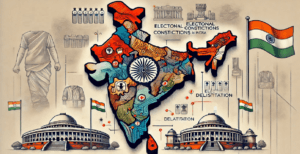Delimitation in India: Balancing Representation Amid Regional Concerns
Delimitation is the process of redrawing electoral boundaries to reflect population changes, ensuring fair representation in Parliament and state assemblies. Governed by Articles 82 and 170(3) of the Constitution, it has been carried out in 1952, 1962, 1972, and 2002. A freeze on delimitation since 1976, extended by the 84th Amendment (2001), will lift after 2026. The upcoming exercise has sparked debate, as northern states have seen higher population growth, potentially increasing their parliamentary seats, while southern states fear reduced representation.
Tamil Nadu strongly opposes the move, arguing it favors the BJP’s strongholds. Southern states contribute 30% of India’s GDP and worry about losing federal resources. Some argue that central policies have historically benefited the South at the expense of states like Bihar and Odisha. The BJP insists the process will be transparent and fair, ensuring balanced representation. The party emphasizes national unity and constitutional principles. Delimitation remains a crucial test for India’s democracy, balancing demographic shifts with equitable governance.

Delimitation in India: Balancing Representation Amid Regional Concerns
Delimitation is the process of redrawing electoral constituency boundaries to reflect population changes. This ensures fair and proportional representation in the Lok Sabha (Parliament) and state assemblies as migration, urbanization, and development reshape demographics. However, the upcoming delimitation exercise, scheduled after 2026, has sparked intense debate, particularly between northern and southern Indian states, over the balance of political representation.
What is Delimitation?
Delimitation involves adjusting electoral boundaries to account for population shifts. The Election Commission oversees this process to ensure equitable representation in both Parliament and state legislatures. It is guided by constitutional provisions, including Article 82, which mandates seat adjustments following each census, and Article 170(3), which applies similar rules to state assemblies. Additionally, Articles 330 and 332 guarantee adequate representation for Scheduled Castes (SCs) and Scheduled Tribes (STs).
To implement delimitation, Parliament enacts a Delimitation Commission Act, establishing an independent body responsible for the process. Delimitation exercises were conducted in 1952, 1962, 1972, and 2002, based on census data. However, political and demographic factors have historically influenced how and when the process is carried out.
Historical Background
India’s first delimitation exercise in 1952 set the number of Lok Sabha seats at 494. Subsequent exercises in 1962 and 1973 increased this number to 543 as the population expanded. However, in 1976, Prime Minister Indira Gandhi’s government imposed a freeze on delimitation until 2001 to prevent states that had successfully controlled population growth from losing parliamentary seats. This freeze was later extended by the 84th Amendment Act in 2001, delaying any changes in seat distribution until after the first post-2026 census.
As a result, current electoral constituencies are based on 2001 Census data, which no longer accurately reflects India’s present population. With a new delimitation exercise approaching, concerns about fairness and regional disparities have come to the forefront.
The 2026 Delimitation Debate
A key concern is the population disparity between northern and southern states. Since 1971, India’s population has grown significantly, but this growth has been uneven. Northern states have experienced higher population increases, while southern states have successfully managed birth rates. Consequently, redrawing constituencies based on current population figures would likely result in increased parliamentary representation for northern states, given their larger populations.
Southern states, particularly Tamil Nadu, strongly oppose this, fearing that their influence in Parliament will decline while northern states gain more seats and political power. More than 36 political parties in Tamil Nadu have united in opposition, arguing that the proposed changes would disproportionately favor Hindi-speaking states, which traditionally support the BJP.
Economic and Political Concerns
Southern states contribute nearly 30% of India’s GDP and argue that reducing their parliamentary representation would also impact their share of central government funds. However, some analysts point out that these states have historically benefited from central policies, such as freight equalization, which enabled southern industries to grow using resources from states like Bihar and Odisha.
A Cornell University study highlighted how such policies contributed to economic decline in resource-rich northern states like Bihar, which, despite its high population density, now accounts for only 2.8% of India’s GDP. Critics argue that underdevelopment in these states must be addressed and that delimitation is a necessary step toward balancing representation.
BJP’s Stance on Delimitation
The BJP supports delimitation as a means of ensuring fair representation and national progress. The party has reassured states that the process will be conducted transparently and inclusively, with input from all stakeholders. While acknowledging the concerns of southern states, the BJP maintains that delimitation aligns with constitutional principles and reflects current demographic realities.
The ruling party emphasizes the importance of national unity and equal representation over regional conflicts. As India moves toward its vision of becoming a developed nation (Viksit Bharat), the BJP insists that every state’s contribution will be recognized and that the delimitation process will uphold the principles of democracy.
In the words of Dr. B.R. Ambedkar: “I want all people to be Indians first, Indian last, and nothing else but Indians.” The upcoming delimitation will be a critical test of whether India can uphold this ideal while ensuring fair representation for all its citizens.
You must be logged in to post a comment.